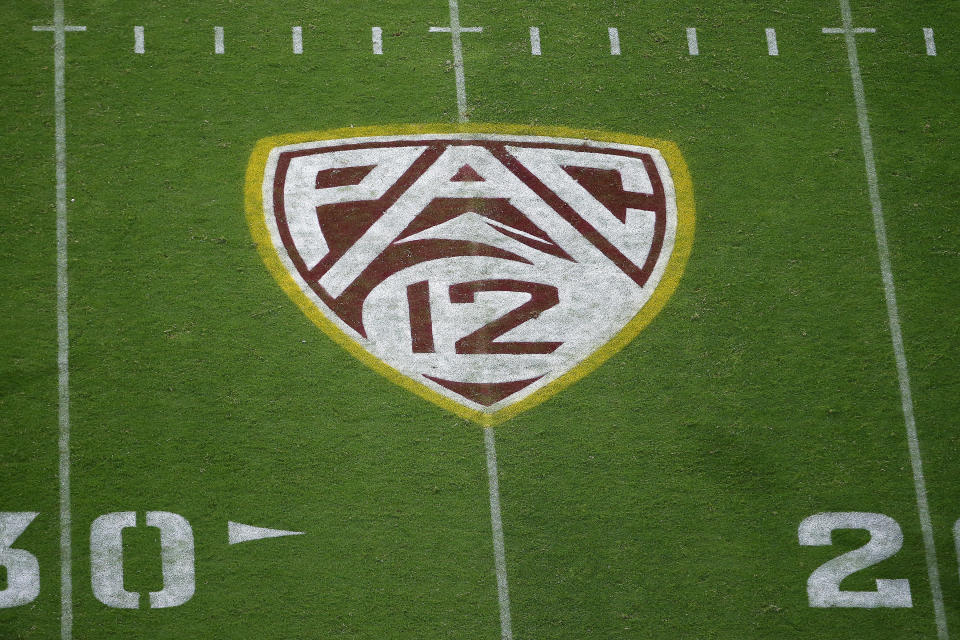After Big Ten decision, challenges still remain for Pac-12's return to football
And then there was one.
With the Big Ten’s Wednesday morning announcement that it will begin its football season the weekend of Oct. 24, the Pac-12 was left out on an island as the lone Power Five conference without a football season scheduled for the fall.
In announcing the decision, the Big Ten cited the availability of daily testing and other medical advancements amid the coronavirus pandemic as the reason its presidents and chancellors were ultimately comfortable with reversing the August decision to postpone fall sports.
The Pac-12 also has access to daily testing, but is dealing with other issues in its quest to return to sports. In a statement that followed the Big Ten announcement, Pac-12 commissioner Larry Scott explained that universities in California and Oregon — which make up six of the conference’s 12 members — do not have clearance to engage in contact practices. States in the Pac-12 footprint are also dealing with the effects of wildfires throughout the region.
“At this time, our universities in California and Oregon do not have approval from state or local public health officials to start contact practice. We are hopeful that our new daily testing capability can help satisfy public health official approvals in California and Oregon to begin contact practice and competition,” Scott said. “We are equally closely monitoring the devastating fires and air quality in our region at this time. We are eager for our student-athletes to have the opportunity to play this season, as soon as it can be done safely and in accordance with public health authority approvals.”
Later Wednesday, after statements from California Gov. Gavin Newsom and from the office of Oregon Gov. Kate Brown, Scott offered a promising update. The two governors indicated that their respective states would grant clearance for things like contact practice.
The next step is for universities to “reach out to their relevant county public health officials to seek clarification on what is required to achieve the same clearance to resume contact practice and competition.” Scott said the six affected universities would do so “immediately.”
Statement from Pac-12 Commissioner Larry Scott on positive developments from governors of California and Oregon: pic.twitter.com/bZVuGT6vuW
— Pac-12 Conference (@pac12) September 16, 2020
Pac-12 was reportedly eyeing mid-to-late November
With those state restrictions looming, players at USC wrote a letter Tuesday to California Gov. Gavin Newsom urging him to loosen those parameters so they could progress toward a return to the field. Later Tuesday, players from other universities — in both California and Oregon — followed up with similar messages on social media.
“The current reality is that there are too many restrictions imposed by state and local public health officials in California that prevent us from resuming practices and competitions,” the USC players’ letter said. “We cannot practice in groups larger than 12, we cannot gather as a team and we cannot utilize any of our indoor facilities. From the onset of this pandemic, the Pac-12 has rightfully and responsibly maintained that their decisions would be based on science, and it now appears that the science and technology have turned in favor of playing.”
In August when fall sports were postponed, the conference said it would not be able to resume play in any sports, including winter sports like basketball, before at least Jan. 1, 2021. But when the Pac-12 gained the ability to test daily via a partnership with a testing company, Scott said it would be possible to play in the 2020 calendar year.
On Monday, ESPN reported that “mid-to-late November” is a target timeframe for the Pac-12 return to play.

What about the MAC and Mountain West?
In addition to the Pac-12, the Mid-American and Mountain West conferences are the other two FBS conferences that have postponed fall sports.
MAC commissioner Jon Steinbrecher said Wednesday that the league is not planning to play any fall sports but has its eyes on the spring.
“Currently there are no plans to play a fall season in any sport. We are focused on providing our fall student-athletes meaningful competitive experiences in the spring,” Steinbrecher said.
The Toledo Blade reported Tuesday that a February start with an eight-game schedule is among the options the MAC is considering for football.
Mountain West commissioner Craig Thompson said that the conference is working daily to try to “facilitate a return to play at the earliest possible opportunity” for football and other sports.
“This includes finalizing a plan for frequent, rapid response testing and continuing to monitor the status of public health directives in our [Mountain West] states and communities,” Thompson said.
On Sept. 8, the Mountain West said in a statement that “many” of the challenges it was facing when it postponed fall sports on Aug. 10 remain and “continue to be beyond the control of the conference and its member institutions.”
In that statement, the conference said it has been “working diligently to identify a viable path forward to resume competition at the appropriate time.”
“Physical and mental health and well-being for the Conference’s student-athletes and staff remains the priority in these efforts,” the conference statement said. “The MW Board of Directors, Athletic Directors, Health & Safety Advisory Committee, Conference staff, institutional athletics administrators, coaches and student-athlete representatives have been meeting frequently to consider new scheduling models, enhanced medical protocols and revised management plans that can facilitate a responsible return to play.”
More from Yahoo Sports:


